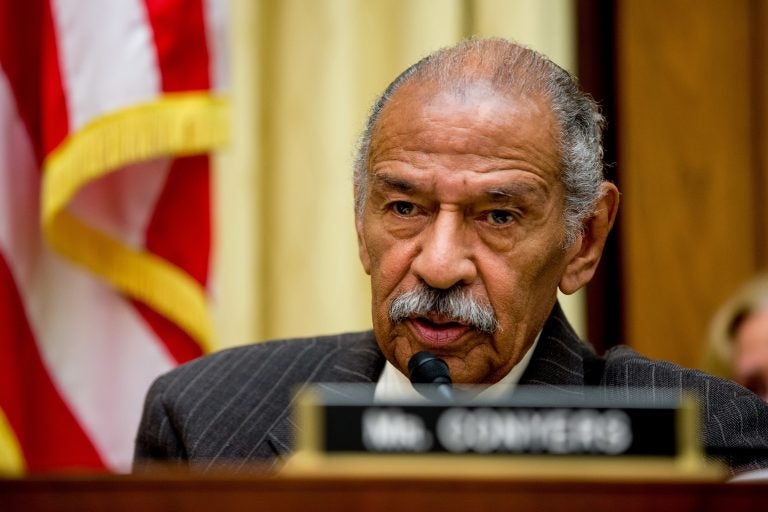Sexual harassment and secrecy on Capitol Hill
It's galling that taxpayers have to foot the bill for sexual harassment settlements on the Hill, without knowing which incumbents should be punished on election day.

Rep. John Conyers, D-Mich., ranking member on the House Judiciary Committee, speaks on Capitol Hill in Washington, Tuesday, May 24, 2016. (AP Photo/Andrew Harnik)
If not for a leak to the press, we’d never have learned that John Conyers, the longest-serving congressman, was secretly accused of sexual harassment and that he secretly settled the case with cash to the accuser. What we don’t know is how many congressional cases have been settled that way, because sexual harassment on Capitol Hill is shrouded in secrecy — as decreed by law.
Conyers announced yesterday that he was giving up his post as the top Democrat on the House Judiciary Committee (but not quitting Congress) “in light of the attention drawn by recent allegations.” I’m betting that he’s merely the tip of the iceberg; problem is, the iceberg is below the surface. But that’s how Congress wants it, because the bipartisan 1995 law that set up the procedure for sexual harassment complaints is rigged to protect members from public exposure.
I know this isn’t the most important issue of the moment — given Trump’s gutting of the State Department, his planned crippling of the Consumer Financial Protection Bureau, his indifference to the threat of new Russian electoral meddling, his fresh attacks on the free press at home and abroad, and so much more — but it’s nonetheless galling that taxpayers have to foot the bill for sexual harassment settlements on the Hill, without knowing which incumbents should be punished on Election Day.
The only reason we know that Congress’ Office of Compliance exists is because a few female members of Congress — ticked off by the recent surge of sexual harassment accusations in politics, media, and show biz — have chosen to publicize it. All we know at this point is that the OOC (via taxpayers) has paid roughly $17 million to settle 268 cases since the ’90s. All we know is that we know very little, because the law mandates non-disclosure agreements.
Because the OOC handles all kinds of discrimination claims against congressmen, we don’t know how much of that money has gone to sexual harassment accusers. Or how many accusers there have been. Or how many congressman have been accused, much less who they are. Or how the accusations may have varied in severity. Or how many victimized women on the Hill haven’t even bothered to approach the OC, because its process is long and cumbersome. Or how many interns may have been harassed, because the law only covers staffers, not interns.
Personally, I’d like to know, at election time, whether the guy I’m planning to vote for had a history of settling sexual harassment cases. But alas, as one Washington watchdog group points out, “Congress has notoriously exempted itself from accountability measures.”
Currently, new bipartisan House and Senate bills would lift the veil of secrecy and require the OC to publicly identify the congressmen who’ve paid settlements, but don’t hold your breath on that happening any time soon. Both Republican chambers are currently too fixated on hashing out a tax “reform” package that will tilt household savings to the upper brackets at the expense of the suckered working-class Trump electorate — and will soon face a year-end sprint on everything from the budget to health care to immigration to disaster relief.
And amidst all that action (or inaction), the John Conyers case will remind us of the rot at the core of the current process. Conyers, age 88, was twice accused in secret; under the auspices of the OC, he reportedly settled with an ex-aide who said she was fired for refusing his sexual advances. And it was pathetic yesterday to watch Nancy Pelosi struggling to defend him on “Meet the Press.”
I’ve argued that Pelosi, the top House Democrat, needs to go. Her performance yesterday was further ammo.
She said, “Just because someone is accused — and was it one accusation? Is it two? I think there has to be — John Conyers is an icon in our country.” But host Chuck Todd pointed out that Conyers, benefiting from the sexual harassment rules, “got to hide his settlement.” Todd asked Pelosi, “Do you believe John Conyers’ accusers?”
Pelosi: “I don’t know who they are. Do you? They have not really come forward.”
No, they have not “really come forward,” because the entire House process, mandated by law, is designed to protect House members … by prohibiting women from publicly coming forward!
If Roy Moore’s strategists down in Alabama have any smarts, they’ll put Pelosi in a new TV ad — showing her extolling an accused sexual harasser as an icon, and hesitating to believe the women. What a swell way to gin up turnout among Republican partisans who already hate Pelosi and want a fresh excuse to say that “everybody does it.”
It would be nice if Pelosi stepped down. It would be nicer if Congress made its sexual harassment process transparent, and gave taxpaying voters the full information about their congressmen. To quote one key senator, “Not surprisingly, many of our citizens have begun to view the Senate and the House of Representatives as the Imperial Congress, as an institution that considers itself above the law and without accountability.”
Oh wait! — that was Bob Dole, the Senate Republican leader in 1995, while he was touting the new sexual harassment law. Somewhere along the way to 2017, the rhetoric fell short.
WHYY is your source for fact-based, in-depth journalism and information. As a nonprofit organization, we rely on financial support from readers like you. Please give today.




